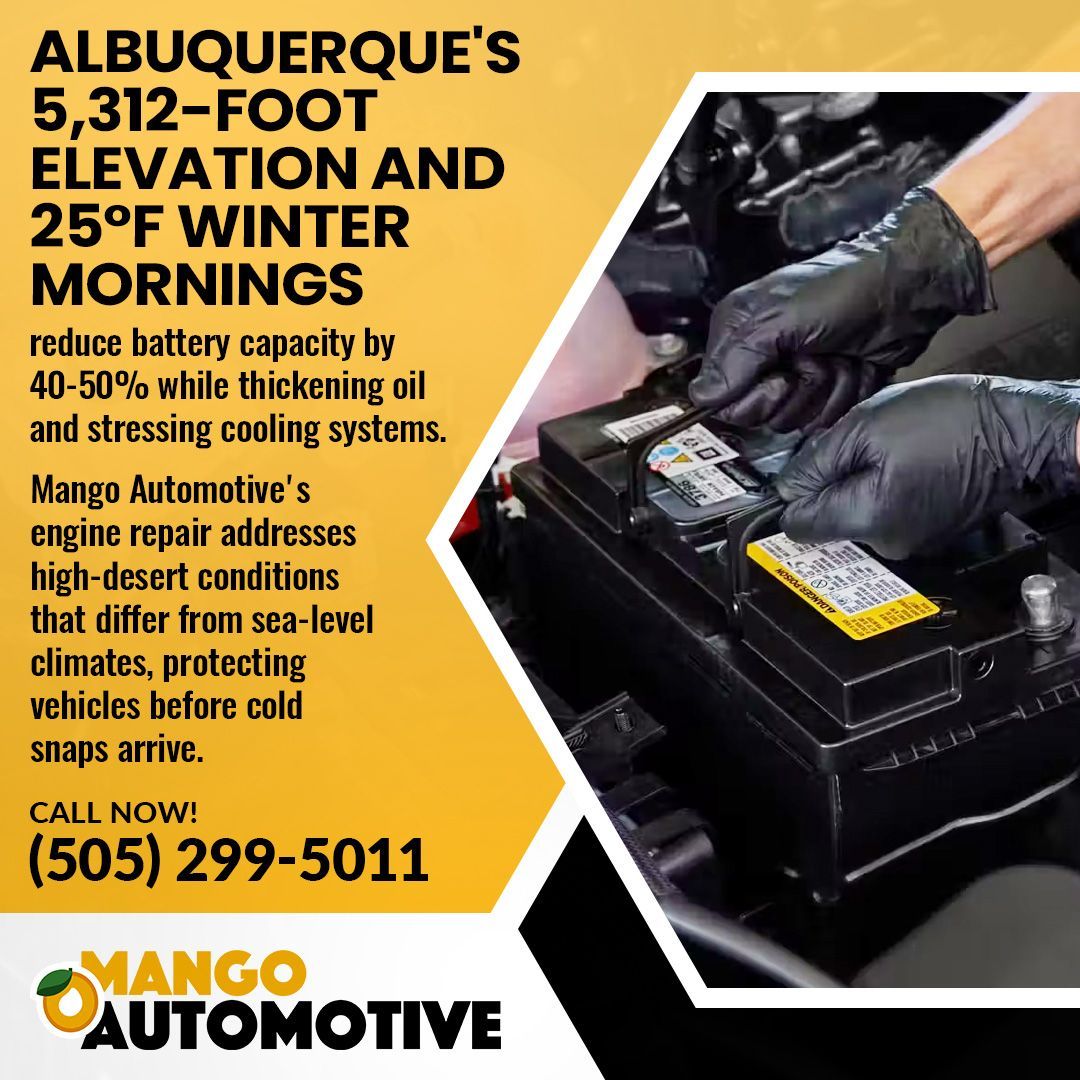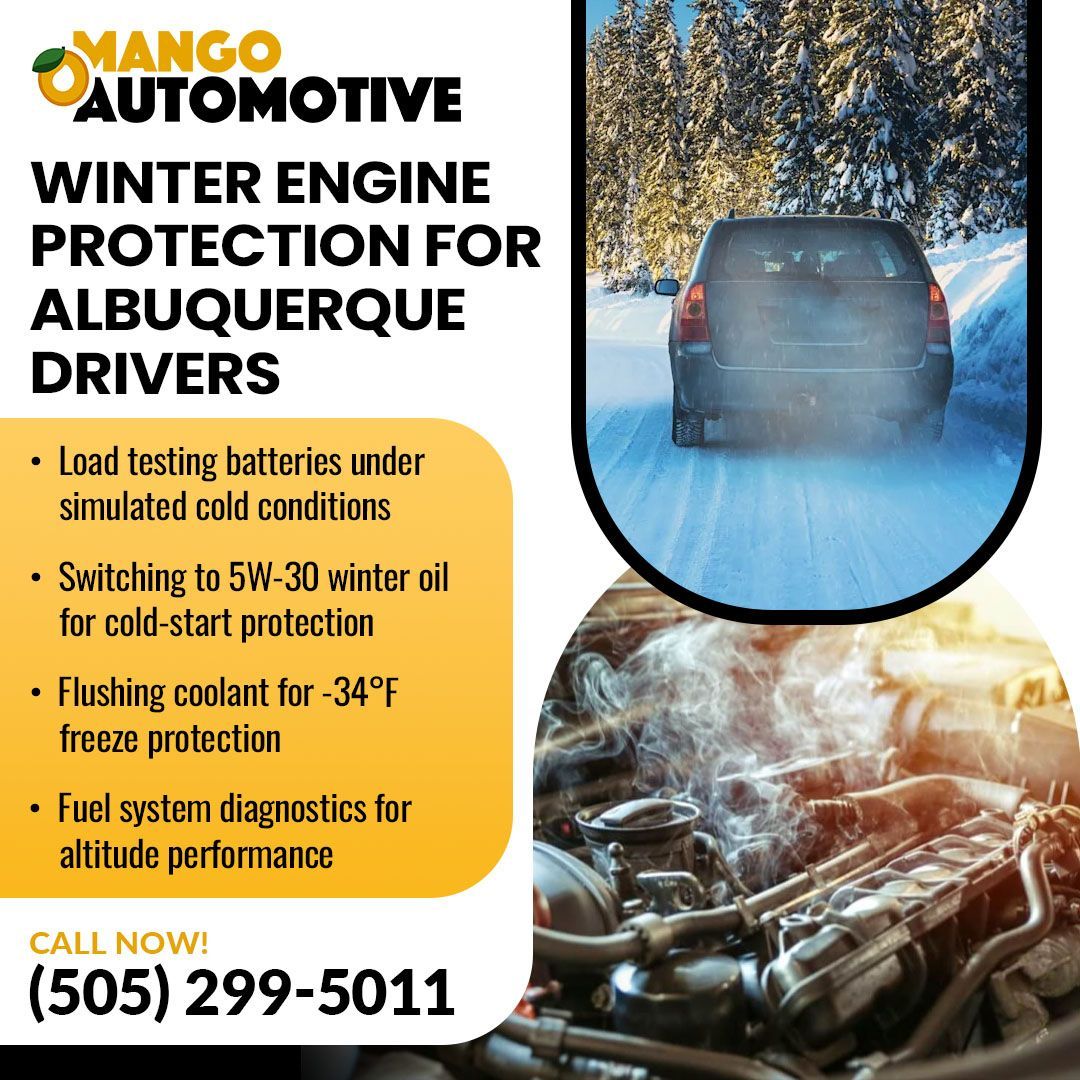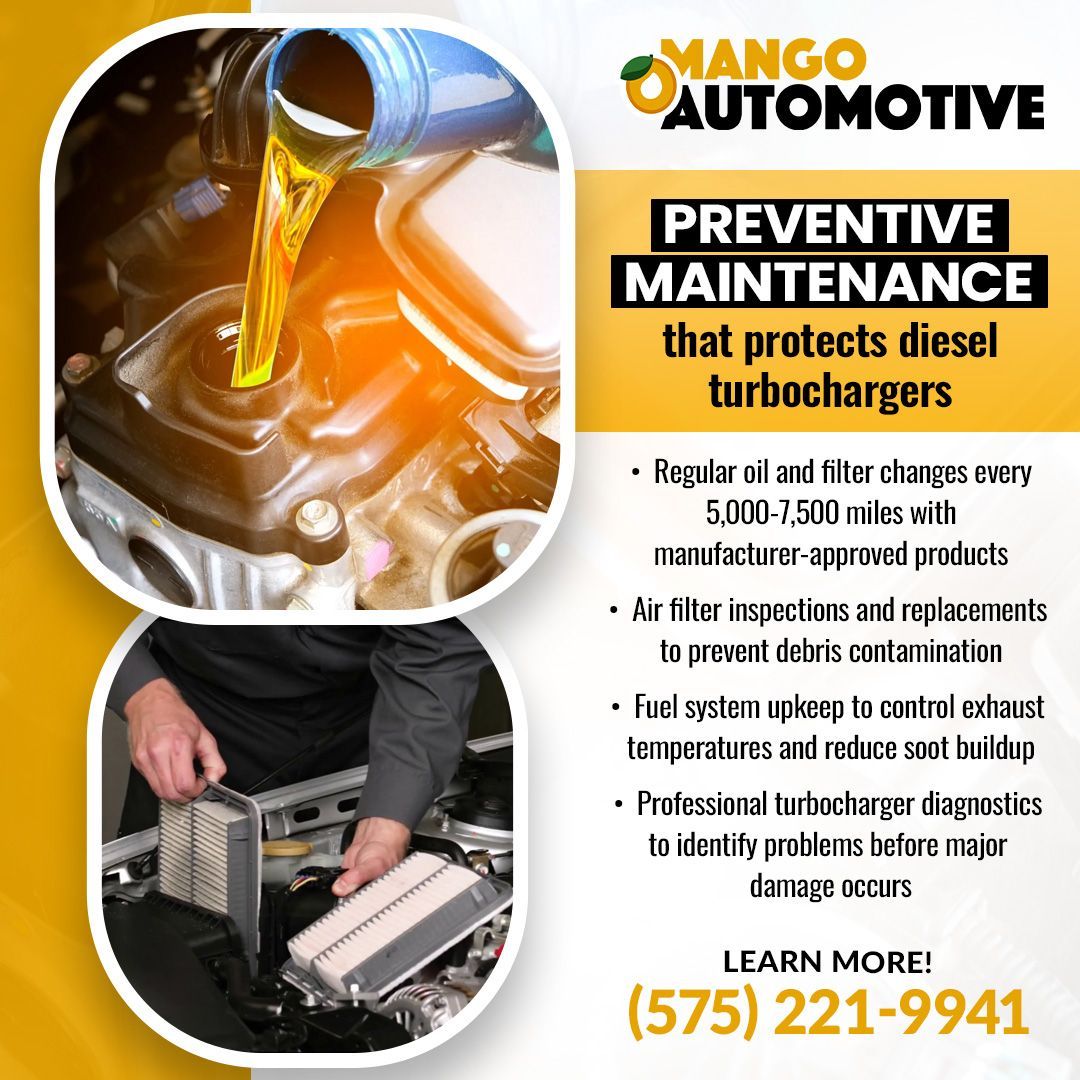How Auto Repair Shops Prevent Engine Problems During Albuquerque's Cold Weather
Cold weather creates specific challenges for vehicle engines. Winter temperatures affect batteries, engine oil, coolant systems, and fuel delivery components in ways that can lead to hard starts, reduced performance, and potential breakdowns. Albuquerque experiences relatively mild winter temperatures averaging between 25°F and 47°F from December through February. The city's elevation of 5,312 feet above sea level affects combustion efficiency during cold starts.
At
Mango Automotive, we understand how Albuquerque's unique climate affects your vehicle. We specialize in
engine repair at the Heights, Albuquerque, preparing engines for winter conditions through systematic testing and maintenance. We use advanced diagnostic equipment to identify potential failures before they occur, focusing on battery testing, winter-grade oil changes, cooling system inspections, and fuel system diagnostics.
Winter weather triggers physical and chemical changes throughout vehicle systems. Metal contracts, fluids thicken, and chemical reactions slow down. We address these interconnected challenges through services that target each vulnerable system, helping drivers maintain reliable transportation throughout the season.

Cold Weather Impact on Engine Systems
Winter temperatures in Albuquerque can alter how engine parts function. The combination of cold mornings, high altitude, and significant day-to-night temperature swings creates unique challenges for vehicle performance.
Battery Performance Decline
Car batteries lose approximately 35% of their cranking power at 32°F and up to 50% at 0°F compared to 80°F. In Albuquerque, most winter mornings start between 20°F and 30°F, meaning batteries operate at 40-50% reduced capacity. Cold temperatures slow the chemical reactions inside batteries that generate electrical current, while engine oil thickens, requiring more power to turn the starter motor.
Auto repair shops recommend replacement of batteries older than three to four years before winter, particularly since overnight temperature swings stress battery chemistry through repeated expansion and contraction cycles.
Oil Viscosity and Lubrication Challenges
At 20°F, which Albuquerque experiences regularly on winter mornings, conventional 10W-30 oil flows much more slowly than at normal operating temperatures. Thick oil creates additional resistance in the starter motor and fails to reach critical components quickly during cold starts. The "W" in ratings like 5W-30 stands for winter performance. The first number shows how oil flows at cold temperatures, while the second indicates viscosity at operating temperature.
Coolant System Vulnerabilities
A 50/50 mixture of antifreeze and water protects engines down to approximately -34°F. While Albuquerque rarely experiences temperatures below 0°F, proper coolant protection remains important. The high-desert climate's temperature swings stress coolant system components. A 50°F afternoon following a 22°F morning causes repeated expansion and contraction of hoses, clamps, and seals.
Radiator hoses face accelerated aging in Albuquerque's dry climate with intense UV exposure during the day and cold nights. Thermostats may stick, preventing proper coolant circulation. Water pumps face additional strain from slightly thicker coolant during cold morning startups.
Fuel System Performance
Gasoline fuel line freezing is extremely rare in Albuquerque's climate. However, moisture accumulation in fuel tanks creates condensation that settles at the bottom, where fuel pumps draw fuel. This issue becomes more pronounced with Albuquerque's 25-35°F daily temperature swings. Fuel filters face increased stress when small amounts of water affect fuel flow, particularly during cold starts.
Understanding these cold-weather vulnerabilities helps drivers recognize when professional automotive repair services become necessary to maintain reliable winter performance.
Professional Preventive Services
Automotive repair facilities, like Mango Automotive, offer specific services designed to prepare vehicles for cold-weather operation, tailored to Albuquerque's conditions.
Battery Testing and Maintenance
Professional battery testing goes beyond simple voltage checks. Shops use load testers that simulate the electrical demands of cold-weather starting at temperatures common in Albuquerque. These tests reveal weak cells that might pass a basic voltage test but fail on a 20°F morning.
Technicians inspect battery cases for damage, clean terminal connections, and apply protective coatings. In Albuquerque's dry climate, dust and mineral deposits from groundwater can create resistance at connections.
Winter Oil Service
Switching to appropriate winter-grade oil ranks among the most important cold-weather preparations. For Albuquerque conditions, multi-viscosity oils like 5W-20 or 5W-30 provide adequate protection. Oil filter replacement accompanies every oil change, providing maximum flow through the lubrication system.
Cooling System Service
Cooling system flushes remove old coolant, rust, and scale buildup that reduce freeze protection and heat transfer. Fresh coolant receives precise mixing to achieve the 50/50 ratio. For Albuquerque, this provides protection down to -34°F, well below the city's record low of -17°F recorded in 1971.
Hose inspections accompany cooling system services. In Albuquerque's intense sun and dry climate, rubber hoses age faster on the exterior while cold nights stress them from the inside. Auto repair technicians check for soft spots, cracks, or hardening. Radiator pressure tests identify small leaks before failures occur.
Ignition System Inspection
Conventional spark plugs require replacement every 30,000 miles, while platinum or iridium plugs last up to 100,000 miles. Cold weather makes worn plugs more problematic because thickened engine oil creates higher compression resistance. At Albuquerque's 5,312-foot elevation, the air-fuel mixture already contains less oxygen, making proper spark formation critical during cold starts.
Belt and Hose Examination
Rubber components face unique challenges in Albuquerque's climate. Intense daytime sun and UV exposure degrade rubber compounds, while cold nights cause contraction and brittleness. A broken serpentine belt disables the alternator, water pump, and power steering simultaneously. Professional auto repair shops inspect belts for cracks, glazing, and proper tension, following replacement intervals around 60,000 miles or sooner in high-UV climates.
Fuel System Diagnostics
Modern diagnostic scanners read data from fuel system sensors, revealing problems with fuel pressure, injector performance, and pump operation. Fuel pressure tests measure pump output directly, with shops adjusting expectations for Albuquerque's altitude, where fuel system dynamics differ slightly from sea-level performance.
Albuquerque-Specific Considerations
Albuquerque's unique climate and geography create specific challenges that differ from both extreme cold climates and moderate sea-level locations. Professional auto repair in Albuquerque requires understanding these local conditions to provide effective winter engine protection.
High Altitude Effects
At 5,312 feet, atmospheric pressure is approximately 83% of sea-level pressure. While oxygen concentration remains constant at 21% of the air, the lower atmospheric pressure means air contains about 17% fewer oxygen molecules than at sea level. This reduced oxygen density affects engine combustion because fewer oxygen molecules are available in each cylinder stroke for complete fuel burning, particularly during cold starts when fuel atomization is compromised by 20-30°F temperatures.
At Mango Automotive, our technicians account for altitude effects when diagnosing cold-weather performance problems. What might indicate a failing sensor at sea level could be normal behavior at Albuquerque's elevation during winter mornings.
Climate-Specific Challenges
Albuquerque experiences daily temperature swings of 25-35°F between overnight lows and afternoon highs, accelerating component wear faster than in stable climates. The high-desert climate brings only 9 inches of precipitation annually, with 44% relative humidity and approximately 310 days of sunshine. This combination requires more frequent component inspections than typical maintenance schedules suggest.
Windshield washer systems face challenges from dust accumulation rather than road salt, requiring winter-grade washer fluid with freeze protection down to at least -20°F for both cleaning and freeze protection.
Maintenance Timing and Schedules
Following structured maintenance schedules prevents most cold-weather engine problems.
Pre-Winter Inspection Timing
Pre-winter inspections should occur in October or early November for Albuquerque vehicles. Complete inspections examine batteries under load, coolant freeze protection, oil condition, belts and hoses for sun damage and brittleness, heater operation, and starter motor performance.
Cold Weather Service Intervals
Cold starts are hardest on engine oil, particularly with short trips common in Albuquerque's urban driving. Auto repair professionals recommend more frequent oil changes during winter for vehicles making frequent short trips. Highway vehicles using synthetic oil may follow slightly extended intervals, but cold weather degrades oil faster than warm-weather driving due to moisture accumulation and incomplete combustion cycles.
Battery testing should occur twice yearly in spring and fall. Most manufacturers recommend coolant replacement every two years or 30,000 miles. In Albuquerque's climate with extreme temperature swings, following the lower end of these intervals provides better protection.
Mango Automotive: Expert Engine Protection Services in Albuquerque
We provide professional automotive repair services focused on preventing cold-weather problems through systematic maintenance tailored to local conditions. Our engine repair at the Heights, Albuquerque, addresses the unique challenges of high-altitude, high-desert winter vehicle care.
Expert Technician Training
At Mango Automotive, our auto repair technicians understand the challenges that Albuquerque's climate and altitude create for vehicle engines. Each vehicle receives individual attention based on driving patterns, vehicle age, and previous maintenance history.
Modern Equipment and Facilities
Our advanced diagnostic equipment accesses manufacturer-specific data for accurate assessments. We test battery performance under conditions matching Albuquerque's typical winter morning temperatures and verify coolant protection well below the coldest expected temperatures.
Comfortable waiting areas allow customers to remain on-site during routine maintenance. Complimentary refreshments and Wi-Fi access make wait times productive. Clear communication defines our service process, which our customers consistently recognize. As one
satisfied customer shared, "We have had the best experiences with Mango Automotive. We have been fortunate to have them fix things on our Suburban multiple times, and they have been quick and their communication has been phenomenal. If you need car help I would go to them and you will have a great experience."
Our
60-month/60,000-mile warranty for auto repair in Albuquerque demonstrates confidence in our work quality, combining 36 months/36,000 miles nationwide coverage with an additional 24 months/24,000 miles.
Warning Signs and Action Steps
Certain symptoms indicate that immediate professional attention becomes necessary to prevent cold-weather engine failures. Watch for these warning signs that require professional inspection:
Slow engine cranking on cold mornings when temperatures drop below 25°F indicates battery weakness or starter motor problems.- Check engine lights during cold starts often signal sensor problems that worsen as temperatures drop.
- Rough idling or extended warm-up periods suggest thermostat problems, fouled spark plugs, or fuel delivery issues that appear more pronounced at Albuquerque's altitude.
- Visible coolant leaks under the vehicle after overnight parking, signal hose failures, or seal problems.
Schedule pre-winter inspections before overnight temperatures regularly drop below freezing. This timing allows completion of identified services before December and January bring the coldest temperatures.

Expert Engine Protection for High-Desert Winters
Cold weather in Albuquerque presents challenges for vehicle engines due to the combination of moderate temperatures, high altitude, extreme daily temperature fluctuations, intense sun exposure, and dry climate. These conditions require specialized knowledge that goes beyond standard maintenance recommendations designed for sea-level or extreme cold climates.
At Mango Automotive, we understand these local conditions and how they affect engine performance. Our systematic approach addresses battery capacity in cold temperatures, oil viscosity requirements, coolant system protection, fuel delivery performance, and component wear accelerated by UV exposure and temperature cycling. We account for altitude effects on combustion and sensor performance that other shops might misdiagnose.
Don't wait for cold weather to reveal engine vulnerabilities. Schedule a pre-winter inspection with our team to protect your vehicle against Albuquerque's winter challenges. We provide specialized engine repair at the Heights, Albuquerque, that keeps your vehicle reliable throughout the season.
Call Mango Automotive today at
(505) 299-5011
to schedule your cold-weather engine inspection. Professional auto repair in Albuquerque keeps you reliably mobile throughout the winter season.














